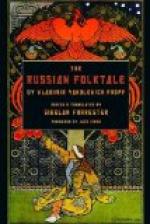a. The establishment
of the personal relation
between the teacher and the listener
108
b. The placing of
the story in a concrete
situation for the child
110
c. The consideration
of the child’s aim in
listening, by the teacher in her
preparation 112
6. The telling of the tale 112
a. The re-creative
method of story-telling.
Illustrated by a criticism of the
telling of
The Princess and the Pea
114
b. The re-creative
method illustrated by The
Foolish, Timid Rabbit
116
7. Adaptation of the
fairy tale. Illustrated by
Thumbelina and by The Snow
Man 118
III. The return from the child 119
Story-telling as one phase
of the art of teaching.
Introductory
119
1. Teaching as good
art and as great art; and
fairy tales as subject-matter suited
to
accomplish high purposes in teaching
120
2. The part the child has to play in story-telling 121
3. The child’s
return, the expression of his
natural instincts or general interests
125
1. The instinct of conversation 125
a. Language expression, oral re-telling 125
b. The formation of original little stories 126
c. Reading of the
tale a form of creative
reaction
127
2. The instinct of inquiry 127
a. Appeal of the folk-tale to this instinct 128
b. The instinct
of inquiry united to the instinct
of conversation, of construction,
and of
artistic expression, illustrated
128
3. The instinct of construction 129
a. Clay-modelling 129
b. Construction of objects 129
4. The instinct of artistic expression 130
a. Cutting of free
silhouette pictures.
Illustrated
130
b. Drawing and crayon-sketching. Illustrated 132
c. Painting. Illustrated 132
d. Song. Illustrated 133
e. Dance, rhythm plays. Illustrated 134
f. Game. Illustrated 135
g. Representation
of the fairy tale. Illustrated
by The Steadfast Tin Soldier
135
h. Free play and dramatization 138
1) Virtues of dramatization 138
a) It develops voice 138
b) It gives grace of movement 138




